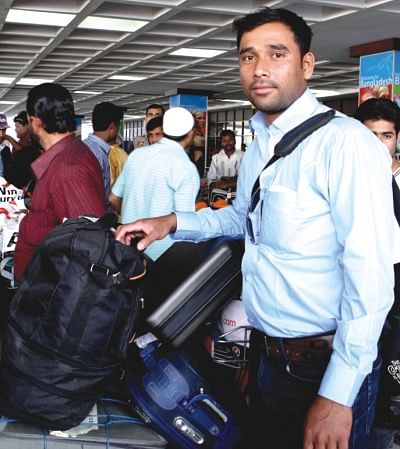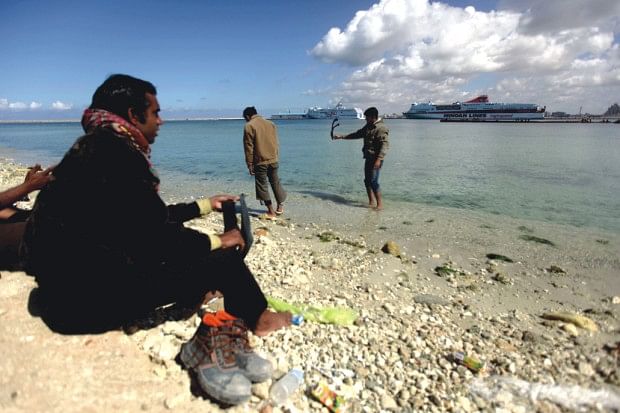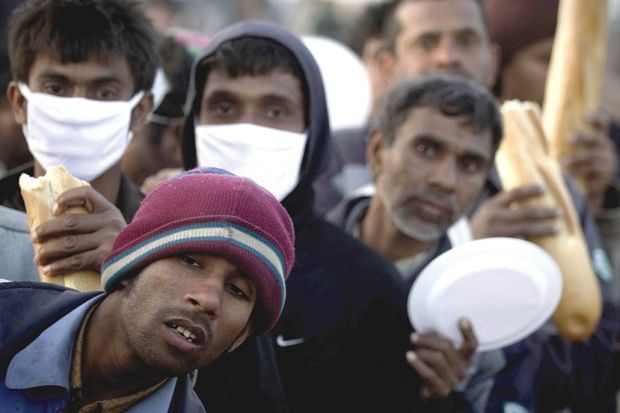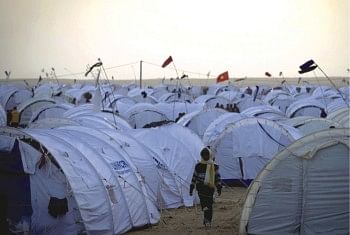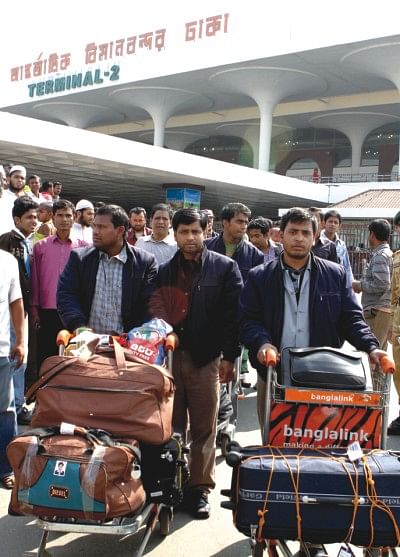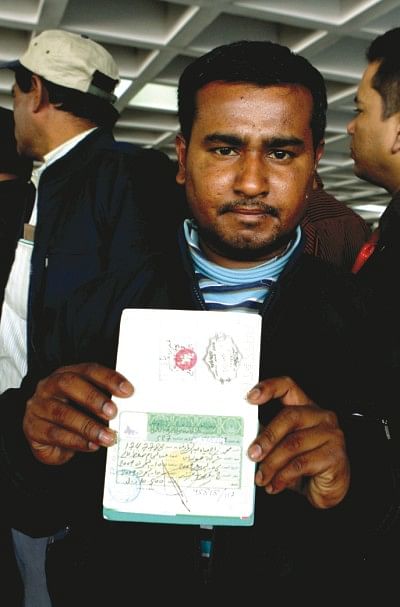| Home - Back Issues - The Team - Contact Us |
 |
| Volume 10 |Issue 10| March 11, 2011 | |
|
|
Cover Story A Warning Bell for Bangladesh TAMANNA KHAN When the global financial crisis hit the world, Bangladesh remained almost immune because of its lower degree of openness to the world economy. However, this time the wave of protest in the Arab world is ringing a warning bell for this developing South Asian nation that has been capitalising on its huge number of unskilled human resource by exporting them mainly to the Middle East. The destiny of Bangladesh and its migrant workers now loom in uncertainty.
February 18, 2011 was a Friday and Joy was resting at the workers' camp, inside the compound of Hyundai, a Korean company, situated in the midst of the desert, couple of miles away from Benghazi. Many of the workers in the camp were chatting about the Libyan driver who had driven from Benghazi the other day and tried to tell them in Arabic about some clashes that took place there. At that time, the workers could hardly imagine what awaited them only a few minutes later. Around 8.15 pm, four vehicles carrying armed Libyans broke into the compound firing indiscriminately and disarming the Bangladeshi security guard at the gate. The sudden attack on the site left the workers totally confused and they ran for their lives in whatever direction they could. "I just ran blindly with the others into the desert. We probably ran for an hour without break and hid ourselves behind some bushes, until the miscreants left," relates Joy who never had such a near death experience in his life. "The attackers had come to loot the company's valuables and take away the vehicles and after that night such attacks became quite frequent," Joy says. When gas, electricity and water supply stopped in the work site, the company's management had no choice but to shut down the site. "One morning, around 6 am we were told to get on hired vehicles that left for the Egyptian border. The only things that I could bring back with me were the clothes that I was wearing," says an upset Joy, who has recently been repatriated from the oil-rich Libya, now in the midst of violent political unrest.
When the global financial crisis hit the world, Bangladesh remained almost immune because of its lower degree of openness to the world economy. However, this time the wave of protest in the Arab world is ringing a warning bell for this developing South Asian nation. For the last four decades, the country has been capitalising on its huge number of unskilled human resources by exporting them mainly to the Middle East. More than 75 per cent of the total overseas employment has been made in countries of the Arab world. According to Bangladesh Association of International Recruiting Agencies (BAIRA), about 86,955 workers have been sent to Libya, alone, between 1976 and 2009. An unexpected civil war in Libya suddenly subjected the fate of more than 60,000 Bangladeshi workers – both skilled and professional– to an abyssal uncertainty. "Between February 28 till date (March 7), about 5000 Bangladeshi workers have returned to the country through different means. There are about 27000 in the pipeline. Most of them came with the help of the recruiting authorities. We had requested the recruiting agencies and they provided the workers with the air ticket. We are bringing back the workers who went through small companies with the assistance of International Organisation for Migration (IOM)," informs Zafar Ahmed Khan, Secretary, Ministry of Expatriates' Welfare and Overseas Employment. Some workers managed to flee privately by bribing Libyan, Egyptian and Tunisian border guards and security forces. Mohammad Rashed Omar who went to work at a Malaysian construction company last October had to spend all his savings in buying air tickets. "Our company had not given the last two month's salary but promised to do so once the bank reopens. One day, the company suddenly closed down without prior notice and 850 Bangladeshi workers including myself got trapped in the worker's camp. Bribing Libyan civilians, we reached the Tunisian border. While crossing into Tunisia, the border guards harassed us and seized all our valuables like mobile and laptop. I have not even been able to recover the three-lakh taka that I had spent to go to Libya," laments Omar, who returned from Libya empty-handed and jobless. According to Anisur Rahman Khan, National Coordinator of International Migrants Alliance Research Foundation (IMA), an organisation that works for workers' rights, most of the workers who had to return from Libya could not complete their contract terms. As a result they have very little or no savings with which they can recover the cost of their migration. Joy, who went to work as a crane operator at Hyundai on January 2010, on a two-year contract, had to sell his shoe shop to finance his migration. "I spent around taka two lakhs to go to Libya," says Joy, whose monthly salary at Hyundai was around Tk 22000. "Only two months ago, I had sent my entire savings for my sister's wedding and now I have nothing," he adds. Although Joy received assurance at the Shahjalal International airport from ministry officials that he would get back his last two month's pending salary from Hyundai, he does not know when it will come or whether he will get back his job if the situation becomes normal again. "We don't have any land except our homestead and here I will not find the kind of job that I used to do there" says Joy, knowing very well that his primary school education will not provide him a job with the same pay-scale as he had in Libya.
Unlike Joy, Mohammad Rashed Omar and Liton Mia both had borrowed money to go abroad but with their meagre monthly salary they failed to save enough for their lenders. Liton, who went to work at a Korean company in Libya on a two-year contract on August 2009, says, "I thought I would be able to stay there for two to five years and earn enough money to return the two-and-a-half lakh taka that I had borrowed for my migration. Now, I neither have any money to start a business nor a job to pay back my creditors." In this regard, Anisur Rahman suggests that using the infrastructure that already existed at district and thana level, the government can temporarily help solve the problem. "Each District Commissioner's office has a migration support centre and the social welfare officer at thana level has the responsibility of looking after migrants workers of that thana. Through this network the government can protect the migrant workers from the immediate pressure of lenders," he proposes. In case the crisis continues to spread in the Middle East, Anisur Rahman says that the government should take up a long term strategy to deal with the situation. "There is lot of money in the Wage Earners' Welfare Fund, using that government can provide some kind of package for these workers. Most of the workers who have come back from foreign countries have some expertise. Using that expertise they can start small businesses if government provides them with small entrepreneurship development fund," he says.
The Secretary for Ministry of Expatriates' Welfare and Overseas Employment, however, assures: "We are registering their names at the airport in our database and using this data, we are thinking about a plan, wherein we can give them priority when sending workers to a third country. We have already told different associated organisations to explore opportunities for this. We will also try to convince the Libyan government through the recruiting agencies to take these workers back, once the situation becomes normal." He also informs that government has a plan that will create a provision for going abroad through the Expatriates' Welfare Bank, which will start its operation in April. "Once the bank starts operating, we will try to sketch out how to incorporate these matters and provide the migrant workers with a packaged deal through which they can go abroad at a minimum cost, earn and remit money through the bank," says Dr Ahmed with hopefully.
War compensation, if any, may provide some solace to the workers coming back from Libya. Citing examples of the Gulf War, Ali Haider Chowdhury, Secretary General of Bangladesh Association of International Recruiting Agencies (BAIRA) says that Bangladeshi workers who came back from Kuwait received compensation through intervention of United Nations. In this case too, he hopes that these workers may also receive some kind of compensation if a war like situation ensues. However, Anisur Rahman points out that many workers who returned from Kuwait did not retain their travel documents and failed to prove their status and were deprived of their compensation. "The workers who are returning should be made aware to retain their travel documents and passports so as to prove their validity if required and government should strictly maintain the data that they are collecting at the airport," he says. He says lessons should be taken from the Malaysian experience when the Malaysian government had offered to take back at a minimum cost, the workers who were deported back to Bangladesh during Malaysian financial crisis. At that time no government data was available on the returning workers as a result the Malaysian immigration and recruitment agencies took advantage of the situation. They sent new batches of workers taking higher amount of money from them, while sending them at minimum cost and thus making undue profit, recalls Anisur Rahman. Besides the workers' future, Bangladesh is very likely to experience a big dip in its remittance earnings if the crisis continues to spread in the Middle East. "Countries like Saudi Arabia, Dubai, Qatar, Bahrain and Yemen are our traditional markets for non-technical labour comprising about 2.5 million skilled and partially-skilled workers. Our foreign currency earnings are linked with these countries. If political unrest spreads in this region, our traditional market will face disaster, and right at this moment we do not know how to tackle that," Ali Haider says. Dr Zafar admits that the political unrest in the Middle East will nevertheless affect the labour market of Bangladesh. "Any kind of unrest reduces the productivity of the country, the industries close down and it takes time to recover. So during that time the job security of our workers will become uncertain. We have already planned to request Economic Relations Division (ERD) to contact the IOM and discuss whether an international multi-donor fund can be created to address the situation."
"Some initiatives have been taken by the government towards exploring new labour markets and five teams including the private sector are working on that issue," informs Haider. However, he is dissatisfied about the progress of work, saying that the teams have not taken any decision in the last eight months. "Our non-traditional markets like Germany and Italy take around 100 or so workers at a time and that too is not regular. The problem is we do not know the demand side requirement and thus we do not have the supply side capacity, so that we can train up sufficient nurses, care-givers and housekeepers." He complains that they do not receive comprehensive data on sector-wise demand for labour in the non-traditional markets. Speaking about tapping new labour markets, Dr Zafar says that there is demand for technical personnel in Europe and America and the market is still open to Bangladesh. He says a lot of technical expert migrate to developed countries like the US and Japan not through the government but by private means. Referring to the doctors working in Libya and other Arab nations, he admits that sending professionals abroad as migrant workers needs to be taken more seriously. "The related ministries should come forward on this issue. There is a lack of graduate nurses in our country and we need to think how we can not only increase qualified nurse for our health sector but also export their service abroad to earn foreign currency. The government is taking steps to send more and more skilled workers abroad by opening about 35 new training institutes." When asked about the lack of information regarding demand for skilled labour in new markets, the secretary admits that currently a comprehensive picture on demand for labour outside the country is not available. "From February 22 to 24, we held meetings with all the labour attachés on this issue at the ministry. We have told them to ensure this information and prepare a five year plan on the demand for labour. At present there are very few labour wings and it needs to be increased," says Dr Zafar. He stresses the need for private recruiting agencies to come up with a correct demand forecast by monitoring and analysing labour trend in different markets.
While searching for new markets can be considered as a long term solution, Dr Anwara Begum , Senior Research Fellow of Bangladesh Institute of Development Studies (currently on leave), who specialises in the area of international migration, says that we should try to utilise the skills of Bangladeshi labour in our own country. "While we were thinking of international migration as a strategy for poverty alleviation we should have looked at it from another stand point – to what extent it is also contributing to poverty and sustenance in our country," she says. Referring to how people's expectation rises and they invest all their savings at the cost of deprivation of current benefits, to finance migration, she says that the risk involved in international migration is very high. "If you look at it from a holistic point of view, not only the resources of Bangladesh will be at stake but also the future well being of the nation. Already we have lost Taka 600 -900 crore in lost migration. We have considered the remittances of the migrant workers as a complete gain. The moment they come back it is not only a family or individual crisis, it is a national crisis," she says. She adds that since most returnees are facing monetary and social loss, the achievements made by Bangladesh in the Millennium Development Goals, as a result of huge inflow of foreign remittances, will reverse. "The economy will suffer to some extent because an additional burden or financing cost of reintegration may have to be shouldered by the government. Many of these people were buying consumer goods and other necessities and spending money within the Bangladesh economy and now this money will be squeezed out. That will create a sluggish trend within the economy. Many families in the rural areas have become poorer. We have got new potential poor and they will have malnourished children, who will not go to school. So in the long run it will be a burden on the nation," warns Dr Anwara. Joy's four-year-old daughter should soon be going to school; secondary school graduate Rashed Omar must have dreamt of sending his son and daughter for higher education, but all those hopes and aspiration have now come to a standstill. Only time and patience decide the fate of Bangladesh along with its hundreds and thousands of migrant workers. Copyright
(R) thedailystar.net 2010 |

